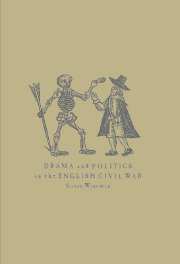Book contents
- Frontmatter
- Contents
- List of illustrations
- A note on texts and list of abbreviations
- Acknowledgements
- Preface
- Introduction: how the drama disappeared
- PART I 1642–1649: CASES IN POLITICS AND DRAMA
- 1 New news for a new world? Genre, politics and the news dialogues of the 1640s
- 2 ‘With the agreement of the people in their hands’: transformations of ‘radical’ drama in the 1640s
- 3 Royalist versus republican ethics and aesthetics: The Famous Tragedie of Charles I and The Tragedy of the Famous Orator Marcus Tullius Cicero
- Interchapter: ‘The life of action’: playing, action and discourse on performance in the 1640s
- PART II THE 1650S: PROTECTORATE, POLITICS AND PERFORMANCE
- Coda
- Notes
- Select bibliography
- Index
2 - ‘With the agreement of the people in their hands’: transformations of ‘radical’ drama in the 1640s
Published online by Cambridge University Press: 20 August 2009
- Frontmatter
- Contents
- List of illustrations
- A note on texts and list of abbreviations
- Acknowledgements
- Preface
- Introduction: how the drama disappeared
- PART I 1642–1649: CASES IN POLITICS AND DRAMA
- 1 New news for a new world? Genre, politics and the news dialogues of the 1640s
- 2 ‘With the agreement of the people in their hands’: transformations of ‘radical’ drama in the 1640s
- 3 Royalist versus republican ethics and aesthetics: The Famous Tragedie of Charles I and The Tragedy of the Famous Orator Marcus Tullius Cicero
- Interchapter: ‘The life of action’: playing, action and discourse on performance in the 1640s
- PART II THE 1650S: PROTECTORATE, POLITICS AND PERFORMANCE
- Coda
- Notes
- Select bibliography
- Index
Summary
INTRODUCTION: RADICAL TALKING
Sinne
{Stage playes
Opinion}
It is a pity that Henry Marten, as a republican, never delivered himself of his Opinions on stage plays. In part this chapter attempts to use the available evidence to reconstruct the positions of tolerationist radicalism and other critical discourses of the 1640s with regard to stage plays and dramatic form. In registering events, as the last chapter argued, pamphlet plays were reciprocally influencing and influenced by contemporary ‘public’ debate. By tracing the playlets offering political critique in the 1640s into the 1650s we can see that some playlets which have been regarded as simply ‘royalist’ have links to the demands and protests in the radical writing of the 1640s: royalist and radical positions in popular polemic were not always diametrically opposed, but drew on some similar strands of popular discontent. Thus, radicalism in popular pamphlets combines at points with popular royalism and, in the 1650s, even with Quaker fervour.
Another reason to return to these texts is that in contemporary literary and historical debate ‘radicalism’ is itself a disputed term. Whilst some critics see early modern radicalism as their object of study, others, including Conal Condren, challenge the term and associated concepts. Condren is obviously right to argue that not only ‘radical’, ‘left’, ‘right’, but other apparently less loaded terms such as ‘citizen’, ‘community’, ‘court’, ‘country’, have resonances for us which inevitably permeate our use of them.
- Type
- Chapter
- Information
- Drama and Politics in the English Civil War , pp. 40 - 61Publisher: Cambridge University PressPrint publication year: 1998



